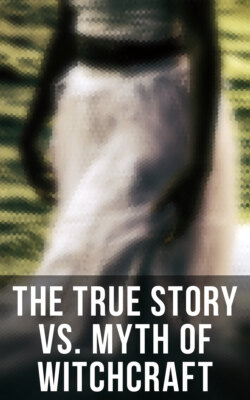Читать книгу The True Story vs. Myth of Witchcraft - William Godwin - Страница 70
На сайте Литреса книга снята с продажи.
Delphi.
ОглавлениеThe oracle of Apollo at Delphi is the most remarkable; and respecting it we are furnished with the greatest body of particulars. The locality of this oracle is said to have been occasioned by the following circumstance. A goat-herd fed his flocks on the acclivity of mount Parnassus. As the animals wandered here and there in pursuit of food, they happened to approach a deep and long chasm which appeared in the rock. From this chasm a vapour issued; and the goats had no sooner inhaled a portion of the vapour, than they began to play and frisk about with singular agility. The goat-herd, observing this, and curious to discover the cause, held his head over the chasm; when, in a short time, the fumes having ascended to his brain, he threw himself into a variety of strange attitudes, and uttered words, which probably he did not understand himself, but which were supposed to convey a prophetic meaning.
This phenomenon was taken advantage of, and a temple to Apollo was erected on the spot. The credulous many believed that here was obviously a centre and focus of divine inspiration. On this mountain Apollo was said to have slain the serpent Python. The apartment of the oracle was immediately over the chasm from which the vapour issued. A priestess delivered the responses, who was called Pythia, probably in commemoration of the exploit which had been performed by Apollo. She sat upon a tripod, or three-legged stool, perforated with holes, over the seat of the vapours. After a time, her figure enlarged itself, her hair stood on end, her complexion and features became altered, her heart panted and her bosom swelled, and her voice grew more than human. In this condition she uttered a number of wild and incoherent phrases, which were supposed to be dictated by the God. The questions which were offered by those who came to consult the oracle were then proposed to her, and her answers taken down by the priest, whose office was to arrange and methodize them, and put them into hexameter verse, after which they were delivered to the votaries. The priestess could only be consulted on one day in every month.
Great ingenuity and contrivance were no doubt required to uphold the credit of the oracle; and no less boldness and self-collectedness on the part of those by whom the machinery was conducted. Like the conjurors of modern times, they took care to be extensively informed as to all such matters respecting which the oracle was likely to be consulted. They listened probably to the Pythia with a superstitious reverence for the incoherent sentences she uttered. She, like them, spent her life in being trained for the office to which she was devoted. All that was rambling and inapplicable in her wild declamation they consigned to oblivion. Whatever seemed to bear on the question proposed they preserved. The persons by whom the responses were digested into hexameter verse, had of course a commission attended with great discretionary power. They, as Horace remarks on another occasion, 2 divided what it was judicious to say, from what it was prudent to omit, dwelt upon one thing, and slurred over and accommodated another, just as would best suit the purpose they had in hand. Beside this, for the most part they clothed the apparent meaning of the oracle in obscurity, and often devised sentences of ambiguous interpretation, that might suit with opposite issues, whichever might happen to fall out. This was perfectly consistent with a high degree of enthusiasm on the part of the priest. However confident he might be in some things, he could not but of necessity feel that his prognostics were surrounded with uncertainty. Whatever decisions of the oracle were frustrated by the event, and we know that there were many of this sort, were speedily forgotten; while those which succeeded, were conveyed from shore to shore, and repeated by every echo. Nor is it surprising that the transmitters of the sentences of the God should in time arrive at an extraordinary degree of sagacity and skill. The oracles accordingly reached to so high a degree of reputation, that, as Cicero observes, no expedition for a long time was undertaken, no colony sent out, and often no affair of any distinguished family or individual entered on, without the previously obtaining their judgment and sanction. Their authority in a word was so high, that the first fathers of the Christian church could no otherwise account for a reputation thus universally received, than by supposing that the devils were permitted by God Almighty to inform the oracles with a more than human prescience, that all the world might be concluded in idolatry and unbelief, 3 and the necessity of a Saviour be made more apparent. The gullibility of man is one of the most prominent features of our nature. Various periods and times, when whole nations have as it were with one consent run into the most incredible and the grossest absurdities, perpetually offer themselves in the page of history; and in the records of remote antiquity it plainly appears that such delusions continued through successive centuries.
